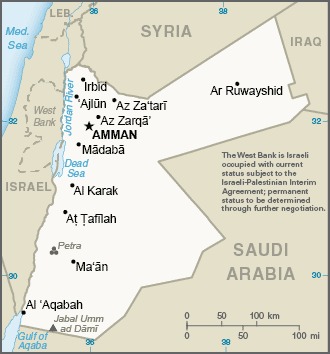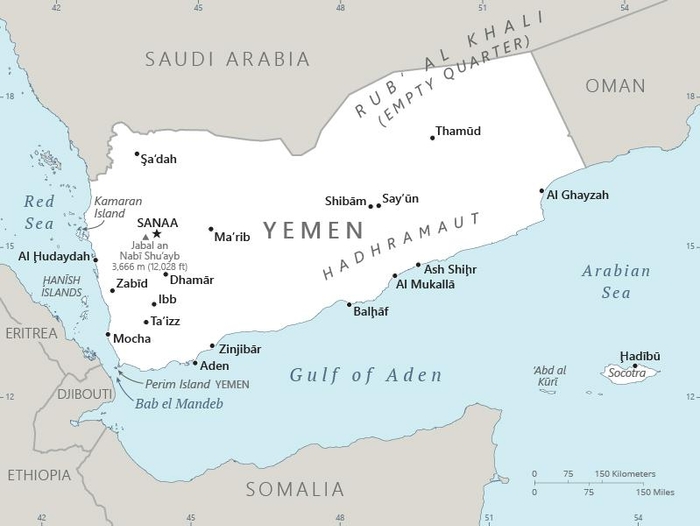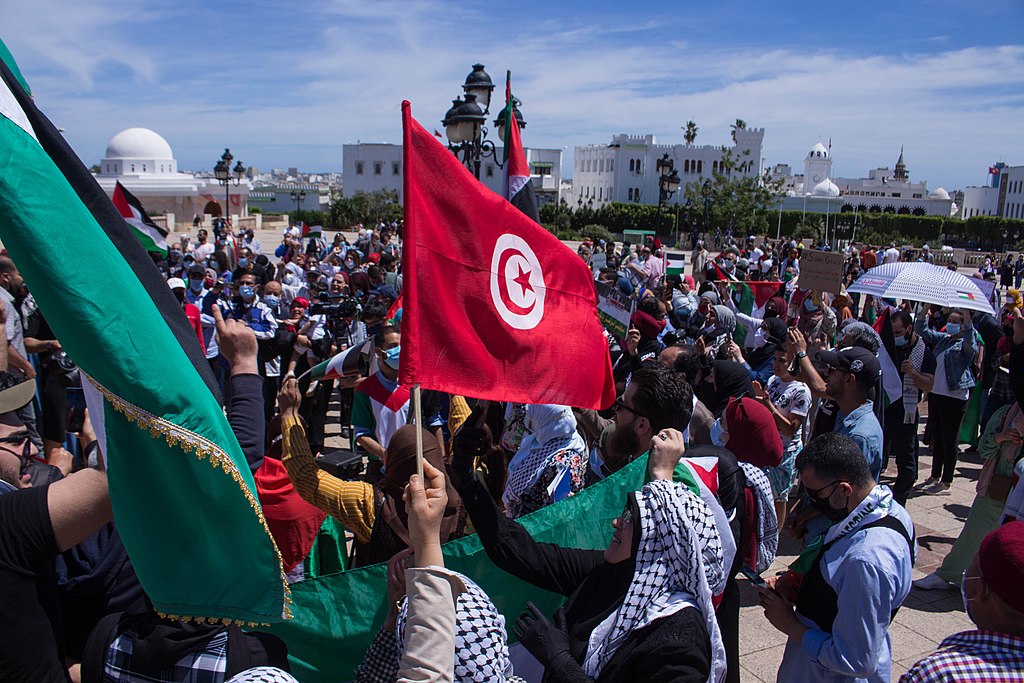
Jordan map showing major cities as well as parts of surrounding countries.
“Gaza not only exposed the failure of the Arab and Islamic regimes in its historical test, but also exposed the silent failure of their peoples, revealed their deteriorating reality, and their weak and shameful positions, and carried the corpse of Arabism to its final resting place.”
“The Arab Street”—a broad term referring to Arab civil society sentiment—is strongly and uniformly opposed to Israeli actions in Gaza, according to several reputable opinion polls.[i] Yet, there has been little to no domestic popular pressure on Arab governments to take meaningful steps to curtail the Israeli campaign.[ii] The first two accompanying excerpts, from the pro-Palestinian daily al-Quds al-Arabi and the pro-Palestinian news website al-Rai al-Yaum, illustrate a perspective that considers the Palestine issue as primarily an Arab—rather than Muslim or nationalist—affair. By this view, the lack of Arab support for Palestine is a simultaneous indictment of Arab governments and the Arab public, both of which are seen as weak and powerless. This state of affairs, one of the authors remarks, has had the effect of “[carrying] the corpse of Arabism to its final resting place.” The assumed powerlessness of Arab citizens and their governments notwithstanding, the “Arab Street” is nevertheless seething. Scenes from Gaza continue flooding traditional and social media, broadcasting what the third accompanying excerpt, also from al-Quds al-Arabi, describes as “a live, terrible, and heartbreaking picture.” Arab governments’ denunciations and symbolic actions against Israel have not turned the Arab public’s focus away from Gaza, which remains a topic of daily discussion. Among Arab governments, Jordan is arguably the most vulnerable to popular pressure due to its large Palestinian population and shared border with the West Bank. The fourth accompanying article, from the Saudi daily al-Sharq al-Awsat, explains in detail the balancing act played by the Jordanian government, which is seeking to placate popular pressure to push back against Israel without enflaming the situation or otherwise “[raising] the ambitions of the angry street.” There is no indication that Gaza will fade from the center of Arab public discourse anytime soon. The relative quiescence of Arab publics and governments vis-à-vis the conflict, therefore, should not obscure the continued pressures that are building on both to take meaningful action as the conflict in Gaza drags on.
Sources:
العدوان على غزة وغياب الصوت العربي الرسمي “The aggression against Gaza and the absence of an official Arab voice,” al-Quds (pro-Palestinian daily), 26 January 2024. https://www.alquds.co.uk/%D8%A7%D9%84%D8%B9%D8%AF%D9%88%D8%A7%D9%86-%D8%B9%D9%84%D9%89-%D8%BA%D8%B2%D8%A9-%D9%88%D8%BA%D9%8A%D8%A7%D8%A8-%D8%A7%D9%84%D8%B5%D9%88%D8%AA-%D8%A7%D9%84%D8%B9%D8%B1%D8%A8%D9%8A-%D8%A7%D9%84%D8%B1
There is no significant influence of Arab activity on the aggression and other things taking place in Gaza…
The Arab Street does not know how this issue is being discussed between Arab leaders and officials, with their counterparts in the world or among themselves, other than what their media circulates about rejection, denunciation, and repudiations, or descriptions of international impotence without holding themselves accountable for this impotence …
Officially, all Arabs reject the aggression that Gaza is being subjected to, and everyone rejects the occupation’s plans, from destruction to displacement to killing. However, the Palestinians have not witnessed any Arab actions to prevent these plans from occurring…
غزة تشيع الشارع العربي إلى مثواه الأخير “Gaza brings the Arab street to its final resting place,” Rai al-Youm (Pro-Palestinian news website), 8 December 2023. https://www.raialyoum.com/%D8%BA%D8%B2%D8%A9-%D8%AA%D8%B4%D9%8A%D8%B9-%D8%A7%D9%84%D8%B4%D8%A7%D8%B1%D8%B9-%D8%A7%D9%84%D8%B9%D8%B1%D8%A8%D9%8A-%D8%A5%D9%84%D9%89-%D9%85%D8%AB%D9%88%D8%A7%D9%87-%D8%A7%D9%84%D8%A3%D8%AE%D9%8A/
Gaza not only exposed the failure of the Arab and Islamic regimes in its historical test, but also exposed the silent failure of their peoples, revealed their deteriorating reality, and their weak and shameful positions, and carried the corpse of Arabism to its final resting place.
غزة تمثل مأزقا للنظام العربي وسط تململ الشارع الغاضب واحتمالات عودة الإسلاميين “Gaza represents a dilemma for the Arab regime amid the angry street restlessness and the possibilities of the return of the Islamists,” al-Quds (pro-Palestinian daily), 2 December 2023. https://www.alquds.co.uk/%D8%BA%D8%B2%D8%A9-%D8%AA%D9%85%D8%AB%D9%84-%D9%85%D8%A3%D8%B2%D9%82%D8%A7-%D9%84%D9%84%D9%86%D8%B8%D8%A7%D9%85-%D8%A7%D9%84%D8%B9%D8%B1%D8%A8%D9%8A-%D9%88%D8%B3%D8%B7-%D8%AA%D9%85%D9%84%D9%85%D9%84/
But the greatest repercussions of the Gaza war are brewing in Arab countries whose screens have not stopped broadcasting a live, terrible and heartbreaking picture of what is happening in the Gaza Strip. The plight of the Palestinians has become part of dialogues on social media platforms and meetings over dinner and in the workplace. This all despite the efforts made by Arab countries to denounce what Israel is doing in Gaza and show political, diplomatic and humanitarian support for the Palestinians in the form of relief convoys, field hospitals, and tolerance for protests. However, the Arab street is seething with anger at the situation, and sometimes uses demonstrations of solidarity with the Palestinians, as it has in the past, to express grievances against the ruling regimes.
الغضب الشعبي والرسمي يكشف مخاوف الأردنيين “Popular and official anger reveal Jordanian fears,” al-Sharq al-Awsat (Saudi daily), 1 December 2023. https://aawsat.com/%D9%81%D9%8A-%D8%A7%D9%84%D8%B9%D9%85%D9%82/%D8%AD%D8%B5%D8%A7%D8%AF-%D8%A7%D9%84%D8%A3%D8%B3%D8%A8%D9%88%D8%B9/4702941-%D8%A7%D9%84%D8%BA%D8%B6%D8%A8-%D8%A7%D9%84%D8%B4%D8%B9%D8%A8%D9%8A-%D9%88%D8%A7%D9%84%D8%B1%D8%B3%D9%85%D9%8A-%D9%8A%D9%83%D8%B4%D9%81-%D9%85%D8%AE%D8%A7%D9%88%D9%81-%D8%A7%D9%84%D8%A3%D8%B1%D8%AF%D9%86%D9%8A%D9%8A%D9%86
The inevitability of the intensification of the war on Gaza, and the possibilities of expanding the scope of the current conflict in the Palestinian territories to the West Bank, are real Jordanian fears that are revealed with daily developments…
Indeed, analysts do not disagree that there is a sharp division among the official elites in their assessment of the situation. There are fears that the statements of Foreign Minister Ayman Safadi will raise the ambitions of the angry street, especially after he described the Jordanian-Israeli peace treaty law as “a document on a shelf with dust” …
On the other hand, traditional elites called for “early recognition of an imminent danger.” The statements of former representatives and ministers Mamdouh Al-Abadi and Samir Al-Habashna and academic Sabri Rabihat received wide popular acceptance when they called on various occasions to “arm the Jordanian people” and prepare public opinion “for a possible military confrontation with Israel, which does not adhere to the values of the peace treaty with Jordan, and is even trying to tamper with it” …
An unknown future awaits Amman on its western border with the occupying state…
Notes:
[i] These polls also generally express strong disapproval of U.S. support for Israel and general approval of the actions of Iran-backed “Resistance Axis” members in Lebanon, Iraq, and Yemen. The polls include:
“Wide public support for Hamas’ offensive on October the 7th, but the vast majority denies that Hamas has committed atrocities against Israeli civilians,” Palestinian Center for Policy and Survey Research, 13 December 2023. https://www.pcpsr.org/en/node/963
“How the Israel-Hamas War in Gaza Is Changing Arab Views,” Arab Barometer, 14 December 2023. https://www.arabbarometer.org/media-news/how-the-israel-hamas-war-in-gaza-is-changing-arab-views/
“New Poll Sheds Light on Saudi Views of Israel-Hamas War,” The Washington Institute for Near East Policy, 21 December 2023. https://www.washingtoninstitute.org/policy-analysis/new-poll-sheds-light-saudi-views-israel-hamas-war
“Arab Public Opinion about the Israeli War on Gaza,” Doha Institute, 10 January 2024. https://www.dohainstitute.org/en/Lists/ACRPS-PDFDocumentLibrary/arab-opinion-war-on-gaza-press-release-en.pdf
[ii] Some protests have occurred in Arabic-speaking countries, but none has been significant or created any meaningful pressures on governments. For Palestinian support in North Africa see: Jason Warner, “North African Wave of Support for Palestinians at Onset of Israel-Hamas War,” OE Watch, 01-2024. https://fmso.tradoc.army.mil/2024/north-african-wave-of-support-for-palestinians-at-onset-of-israel-hamas-war/
Image Information:
Image: Jordan map showing major cities as well as parts of surrounding countries.
Source: https://www.cia.gov/the-world-factbook/countries/jordan/map
Attribution: Public Domain


